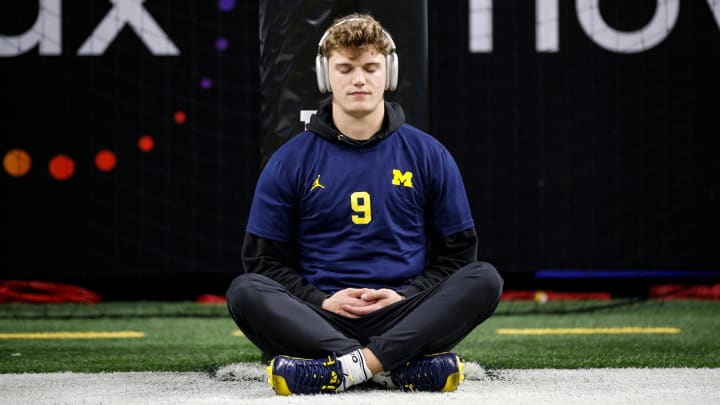Matthew Coller: J.J. McCarthy is anchored by meditation

EAGAN — During the lead up to the NFL Draft, analysts brought up one particular stat about quarterback JJ McCarthy more than any other: He only lost one game between high school and college. While that is certainly the type of number that any quarterback would want to be associated with, it implies that he hasn’t run into many road blocks. But in 2020 he was struggling.
That year McCarthy moved from Illinois to Florida to attend IMG Academy because his home state had shut down football for the year due to COVID. As a social person, he wasn’t doing well being isolated due to COVID restrictions.
“My senior year at IMG Academy was during COVID and I went through a period of depression,” McCarthy said. “I was in a really dark spot. I had a blessed upbringing and I never really knew what depression and anxiety was all about. Going through that alone and being isolated at a boarding school, I didn’t have many resources to help me out with mental health.”
The young quarterback did what kids these days do: He started looking for solutions on the internet. What he ran across was the concept of meditation.
“I started learning about it, studying it, researching it and I never really got anywhere until I started practicing it,” McCarthy said. “Once I started doing it over a period of time, I started experiencing the benefits.”
Before every game in college at Michigan he would sit below the goal posts and go through his meditation routine. As the Wolverines won and won, it became something that TV cameras and photojournalists would capture. In the national championship game against Washington, McCarthy didn’t change his routine, even with all the extra attention.
“Meditation is definitely my anchor,” McCarthy said. “I do that every single morning and… I finish my day with meditation. It keeps me in the present moment. It helps me be self aware so I can learn so much about myself.”
McCarthy’s openness about his efforts to address mental health is part of a trend among top athletes and all pro leagues. At the Olympics a photo was snapped of legendary gymnast Simone Biles in a meditative pose. “Mental health matters,” she captioned the picture on her Instagram. In 2019 the NFLPA formed a Comprehensive Mental Health and Wellness Committee and mandated that teams have someone on staff to support mental health.
There’s no doubt that it’s progress to have an NFL quarterback who is willing to address a subject that used to be kept in the shadows. But how exactly is meditation helping football players?
For that, we go to Dr. Justin Anderson, founder and CEO of Minnesota-based Premier Sport Psychology.
“It really allows the mind to release a lot of clutter,” said Dr. Anderson.
Dr. Anderson could not speak directly to McCarthy’s personal use of meditation because he is affiliated with the Vikings but he was able to explain why so many athletes meditate.
“A lot of these guys are high achievers, they are perfectionistic personalities and it’s one of the reasons that they have climbed the ladder and have gotten to where they have gotten,” Dr. Anderson said. “But with that comes an over-analyzing brain. A brain that continues to turn on and try to solve problems... Their minds start to go down different tracks and can get hooked on things. That can be previous mistakes, future contracts, what slot they are in the depth chart and things like that.”
There are many types of meditation but Dr. Anderson explained that people commonly will either allow their mind to wander and then explore why it is wandering in that direction or stay focused on one thing and control their breathing.
The calming effect of controlling breathing has to do with the nervous system. The parasympathetic nervous system is a system of nerves that helps the body relax and reach what is called the “rest and digest” state.
“We can learn more, we can be a little more creative and open ended [in the rest-and-digest state],” Dr. Anderson said. “We want to do that because when the mind is racing and we’re in a defensive space, we are in the sympathetic nervous system which is more fight-or-flight response to stress.”
Calming the nervous system can help with retaining information, which would apply heavily to football.
Furthermore from the biological aspect, human bodies have a hormone called “cortisol” that helps the body respond to stress and danger. It has a lot of important functions like regulating sleep cycle and regulating blood pressure but too much of it can have negative effects physically, mentally and emotionally. Meditation can slow the body from releasing too much cortisol because of stress.
That doesn’t mean that meditation is the solution to all stress. It would be impossible for NFL players to wipe away all their troubles during the 17-game roller coaster that is the NFL. It’s more about finding ways to manage that stress.
“We are trying to get these guys into a calmer space… so they can prepare for competition coming up without fear and defensiveness that tends to come with these high-level performers,” Dr. Anderson said.
The buy-in from high profile athletes to mental health solutions has been refreshing for Dr. Anderson, whose passion for sports psychology stemmed from his experience as a former college quarterback.
“People are starting to say, ‘hey, this is part of my overall wellbeing and health, why wouldn’t I want to have my mental be as healthy as my physical?’” Dr. Anderson said.
On Saturday the Vikings play their first preseason game of the year, we can expect McCarthy to stick with the same routine, sitting under the goal posts doing his meditation session before hitting the field for the first time in a purple uniform.
“I won’t go a day without doing it,” McCarthy said.